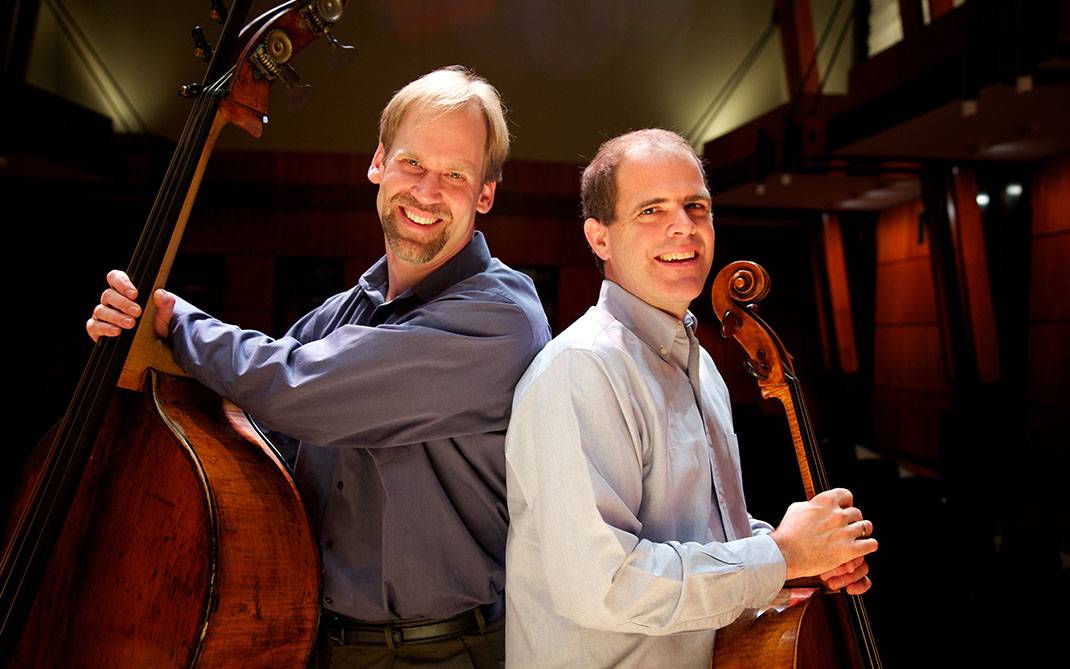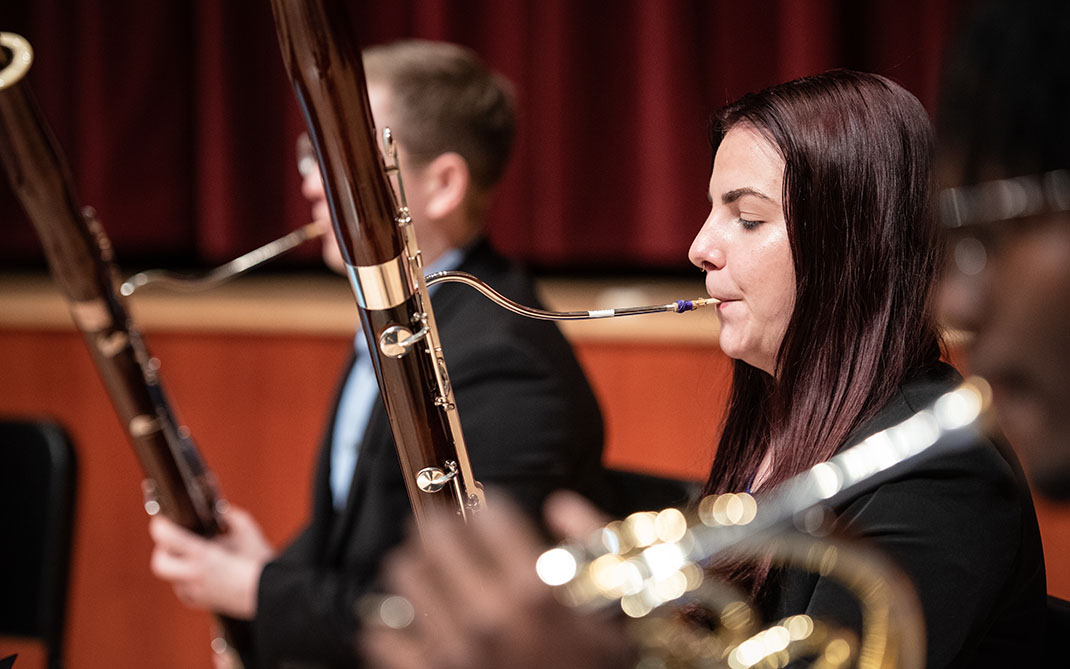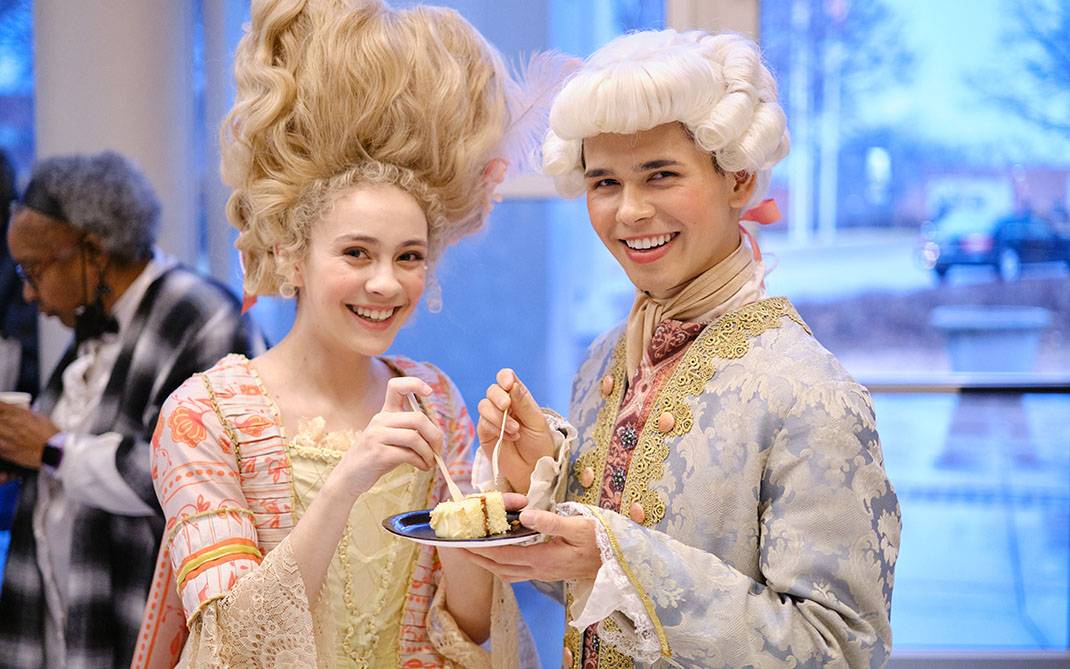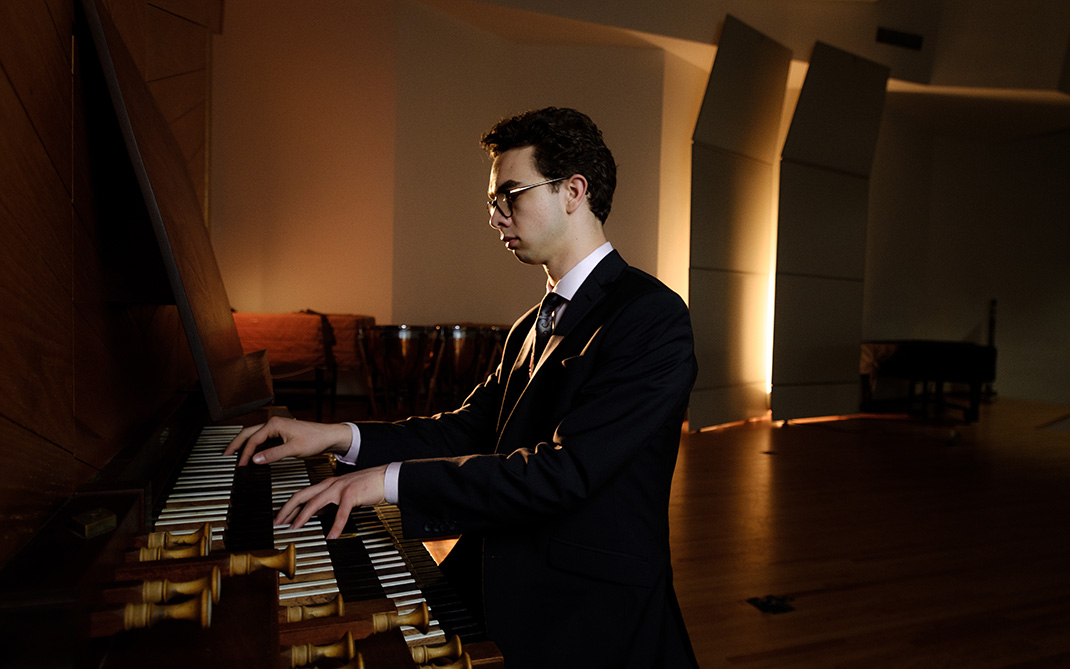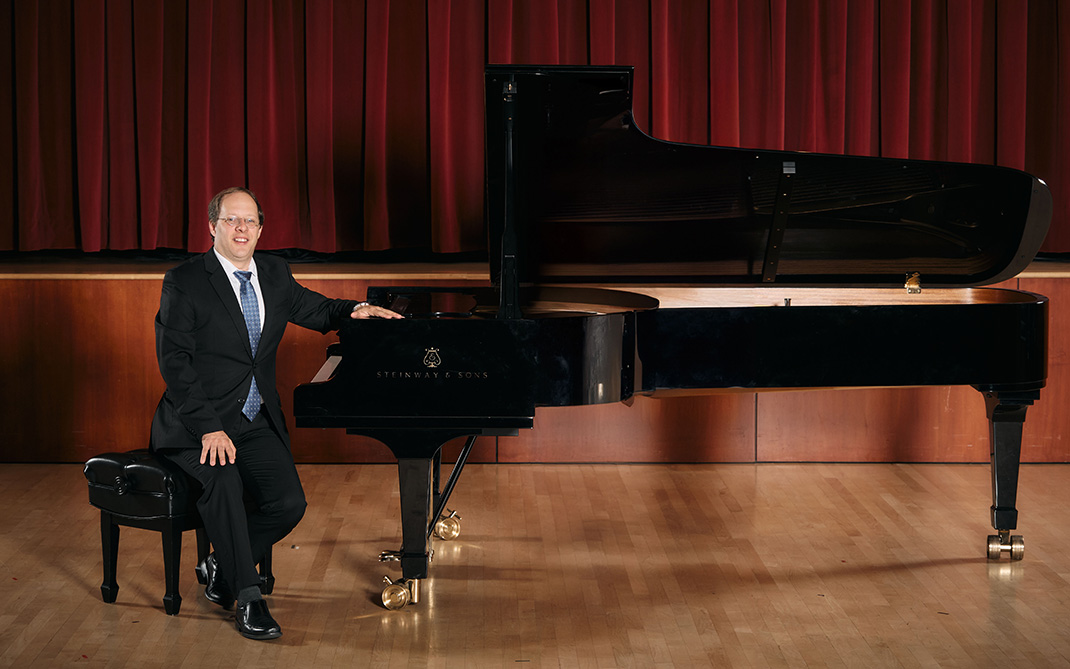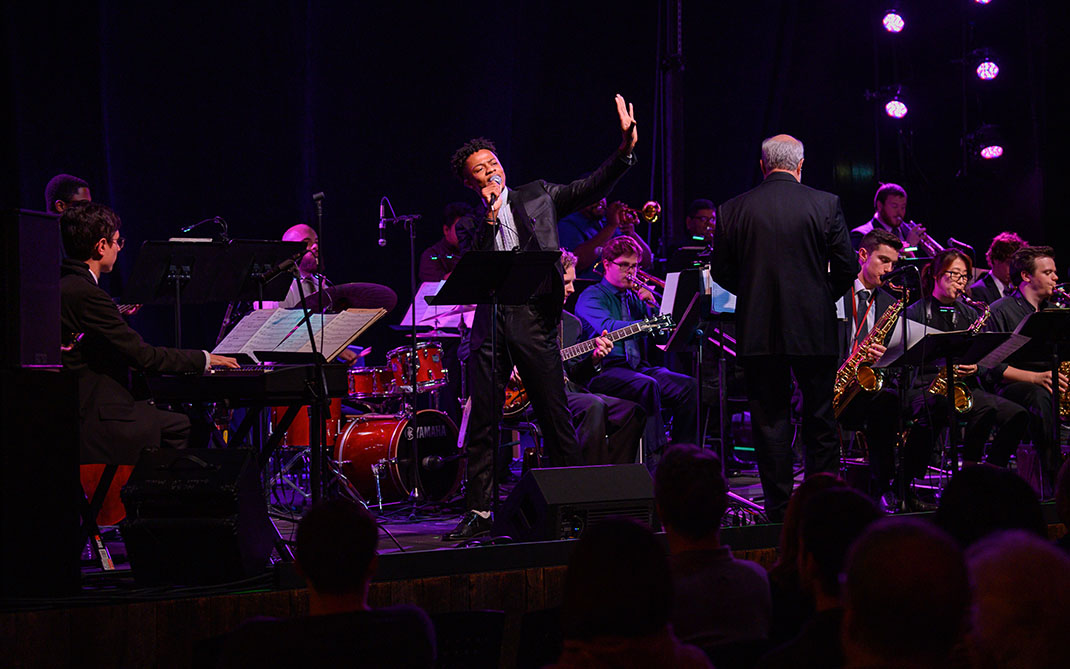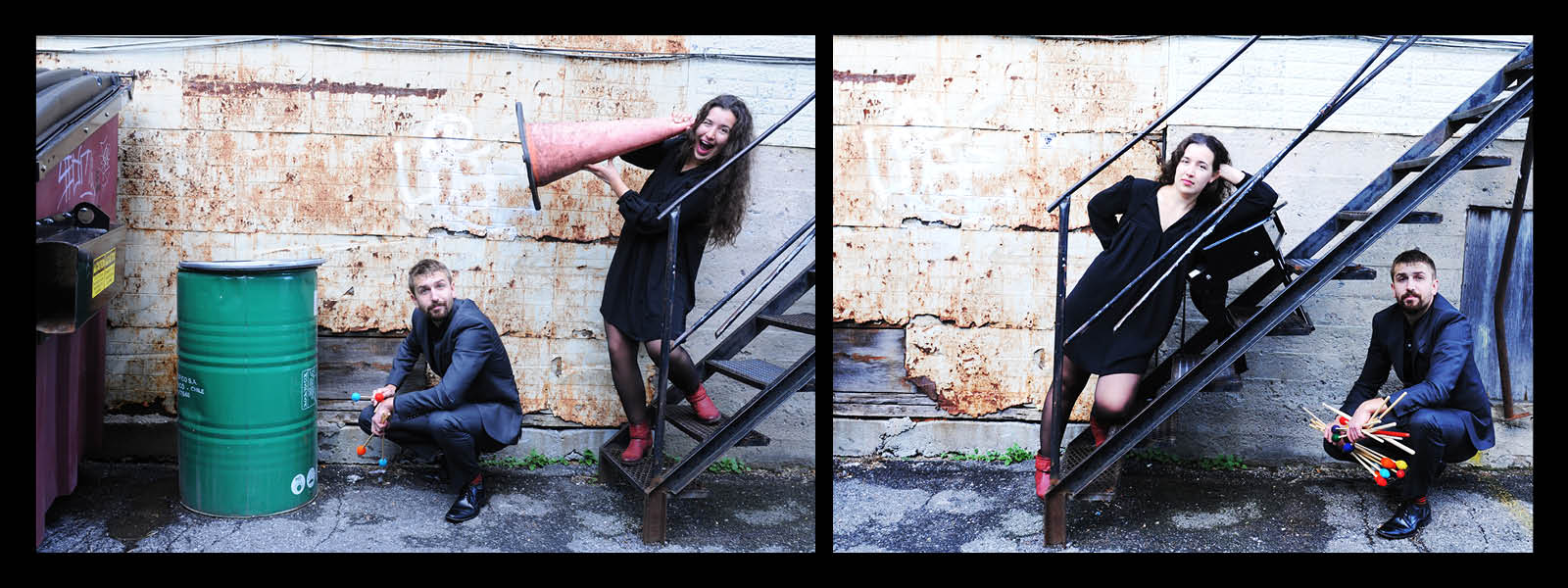SHHH!! Ensemble
Listen to the interview on Apple, Spotify, or your listening platform of choice. Captioned interviews are available on YouTube.
The views and opinions expressed by speakers and presenters in connection with Art Restart are their own, and not an endorsement by the Thomas S. Kenan Institute for the Arts and the UNC School of the Arts. This interview has been edited for length and clarity.
You might be forgiven for guessing SHHH!! Ensemble to be a collection of musically minded librarians, but you’d be way off the mark. Because SHHH!! Ensemble makes noise. A lot of it. On a variety of instruments. And people are loving it. Which might be especially surprising given that SHHH!! mostly plays contemporary classical works, a genre that can be intimidating to many audiences. So how do they do it?
SHHH!! comprises Ottawa-based life partners Edana Higham, a pianist, and Zac Pulak, a percussionist, making them possibly the world’s only professional piano/percussion duo. Since launching their ensemble in 2016, Edana and Zac have made waves in Canada’s classical-music scene, playing in venues and festivals from coast to coast and garnering raves from critics and audiences alike. They have collaborated with renowned contemporary classical composers, including John Beckwith, Monica Pearce and past Art Restart guest Frank Horvat.
Here they explain how they decided to join musical forces and how they’ve developed the “avant-accessible” style that at each performance invites an audience to take a meticulously curated and delightful musical journey with them
Choose a question below to begin exploring the interview:
- How did the two of you decide to merge your individual talents to create a new ensemble?
- Since there isn’t a repertoire specifically for your ensemble, how did you go about commissioning composers?
- Had you not created SHHH!! Ensemble, what kind of career were you imagining for yourself?
- What were your biggest challenges in the first couple of years that you were officially an ensemble?
- How did you develop your vision for audience engagement? How did you know you were going to not only play a concert but also put on a show?
- Could you talk about your experience as an audience going to classical music and what you think needs to be changed for audiences to feel more welcome?
- What genre would you yourselves classify yourselves? If you could make up your own label, what would it be?
- In what ways could the business of classical music be changed to allow the kind of innovation you’re passionate about?
- How would you teach the importance of [audience engagement] to conservatory students?
- Looking at the next several months, what are you most looking forward to?
Pier Carlo Talenti: How did the two of you decide to merge your individual talents to create a new ensemble?
Edana Higham: We had been a couple for a few years, and we were both attending residencies at the Banff Centre for Arts and Creativity in Canada. We had coordinated to do our independent residencies at the same time. While we were there, we sort of shifted gears. People kept asking us, “Do you guys ever play together?” And we’re like, “No, not really. We haven’t tried that yet.” We started talking about it during that residency, and it seemed like something that we both wanted to pursue. So that’s kind of how it all started in 2016.
Pier Carlo: Other people kept asking you, but what made you think, “Oh, this is a duet that could work?”
Zac Pulak: The big thing for us was that when people started asking us this, we realized that there wasn’t actually that much repertoire. When people think of piano and percussion, the thing that comes to mind is the Bartók "Sonata," which is two pianos and two percussion. But beyond that piece, there’s only maybe a handful of pieces that exist out there, so we thought it was a really special opportunity to build a repertoire from the ground up.
Pier Carlo: I see. So that was one of your main interests, basically filling an existing hole in the repertoire.
Zac: Exactly, yeah.
Pier Carlo: Piano is considered a percussion instrument as well as keyboard, right?
Edana: Yes, it definitely is. Especially the way I get to play it in a lot of our pieces, it’s treated quite percussively.
Pier Carlo: Oh, can you give me examples of that?
Edana: Well, all the repeated notes that would be like hitting a marimba or something. Yeah, I get a lot of that kind of writing in a lot of our pieces.
Zac: Well, we sometimes ask for that, but it often just comes out naturally. The composer knows we’re a piano/percussion duo, and the piano gets treated more percussively just by virtue of the instrumentation. So it’s actually surprising when we get a piece, and it’s like, “Oh, this looks like a more traditional piano part!” [He laughs.]
Edana: [Laughing] More like a lyrical part. Yeah, that’s always surprising.
Pier Carlo: Describe the first time you performed together. What was that like? What were you playing?
Zac: Well, I think, Edana, correct me if I’m wrong, but —
Pier Carlo: Was it at Banff?
Zac: Well, maybe we were just discussing in Banff, and we didn’t actually —
Edana: Perform in that first residency, no.
Zac: But one of the first pieces we looked at together was a guitar-and-piano piece, the “Fantasia for Guitar and Piano” by Mario Castelnuovo-Tedesco. Edana’s dad is a classical guitarist and did an entire degree researching Mario Castelnuovo-Tedesco, so it was a composer that Edana knew well and a piece that Edana had heard. And it was just something that worked really nicely on marimba. It was a great way for us to get started.
Pier Carlo: At what point did you think, “Oh, wait, I think we’re onto something. I think this could be the thing, the career”?
Zac: Well, I think we just both really enjoyed that first exploring this piece together, something that to our knowledge had never been done or arranged in that way. It was just really fun; we had a blast. Then we started thinking about other pieces that we could either commission or arrange, and things just snowballed from there.
Pier Carlo: Since there isn’t a repertoire specifically for your ensemble, how did you go about commissioning composers? How did you let them know you were worthwhile, and how did you line up funds to commission them?
Zac: Our first commissions, I guess you could say, were from friends and family friends, at least for the first big piece we had, which was by the Canadian composer John Beckwith, who was a family friend. He wrote it just out of the kindness of his heart. And how old was he, Edana? He was 93, 94 years old when he wrote the piece for us, and it turned out to be one of the last major works that he wrote.
It’s a gorgeous piece. It’s called “Meanwhile,” and it’s also the title track of our debut album. That piece has been with us since the very beginning of our duo, so it’s pretty special.
Pier Carlo: Thereafter, how did you go about creating all those relationships outside of your existing friends-and-family circle?
Zac: Well, I think that the really nice thing about being a piano/percussion duo is that most composers, except for the ones that have worked with us, haven’t had the opportunity to necessarily write for that instrumentation.
Pier Carlo: So it’s inherently interesting?
Zac: Yeah, exactly. So I think that’s helped us kickstart a lot of things, especially before we had built up any sort of reputation.
Then, to answer your question about funding, in Canada we’re quite lucky in that there’s three tiers of funding: municipal, provincial and federal. And within those different tiers of public funding, there are grants specifically for commissioning new work from composers. We’ve definitely made good use of that, but because of that, we’ve mainly worked with Canadian composers. So it’s a bit of a double-edged sword, I guess you could say, in that way.
Pier Carlo: Edana, had you not created SHHH!! Ensemble, what kind of career were you imagining for yourself?
Edana: Yeah, that’s a good question. I guess I was really fortunate that when we did create SHHH!!, I was pretty fresh out of school. I was only about six months out of school, so I didn’t have a chance to explore other things before. But I had always had a huge interest in contemporary music from a very young age. I think my teachers at the time always encouraged that, so I always knew that contemporary music and hopefully commissioning was going to be a part of my existence.
I guess I probably imagined myself working more with string players and stuff, but [laughing] when I had a percussionist right there, that’s the way it went. Anyway, he bows marimba sometimes. It’s all good.
Pier Carlo: Zac, what kind of career were you mapping out for yourself?
Zac: We went to the University of Ottawa. That school, for percussion especially and the other orchestra instruments, is a really orchestra-focused program. I got a really wonderful foundation from my teachers, and I sub occasionally with orchestras as an extra musician, so that part of my career is still something that I do.
But SHHH!! Ensemble has been just wonderful for being able to fully immerse myself in contemporary music. Just like Edana, from a fairly young age, from when I first started playing, I really knew I wanted to be doing something with new music. I couldn’t really imagine doing it another way.
Pier Carlo: What were your biggest challenges in the first couple of years that you were officially an ensemble? How did you line up for your first bookings?
Edana: I think one of the biggest things was convincing presenters that we could draw an audience and that, just because we were playing contemporary music, it wouldn’t alienate an audience, just because we weren’t a string quartet or a piano trio playing Beethoven with maybe just one contemporary piece. That was a big thing, convincing presenters that if we were doing an all-contemporary program, it would still be engaging and exciting for the audience and that they would enjoy their evening.
Pier Carlo: So how did you plan that? Because I know for many people, new contemporary classical music can be a little daunting and a little off-putting. People think of it as “difficult.” So how did you plan your programs so that you knew your audience would be engaged?
Zac: For us, the audience experience is really at the forefront. When we’re planning a program, that’s what we’re thinking of, in terms of how we’re trying to create an arc across the program and really make it a full experience that’s connected from beginning to end.
Pier Carlo: Can you give me an example of how that works?
Zac: Well, for instance, one of the projects that we worked on over the pandemic was a program that was a continuous program. Each piece dovetailed into the next one and just created this 45-minute or hourlong arc that was just continuous music, kind of going from one thing to another. We challenged ourselves to try to be able to tell this story through just sound while trying to keep it engaging and interesting the whole time.
Edana: Sound and movement as well. We worked with a choreographer to connect all the pieces to make it visually seamless as well.
Pier Carlo: Right, because there is a lot of movement in your pieces. How did you develop your vision for audience engagement? At what point did you start bringing in a choreographer, for instance? How did you know you were going to not only play a concert but also put on a show?
Zac: I think that just naturally came out of something that we are both drawn to. One of my pet peeves, at least as an audience member at concerts, is sort of the in-between time between pieces, if there’s shuffling onstage and this kind of thing. And so that again from the very beginning was, “How can we turn this necessary movement into a part of the show?”
I don’t remember where we heard this quote, but I love this word: chore-eography. I can’t give credit to whoever told us that because I don’t remember, but we always think about the chore-eography of the transitions between pieces. How can we either make it a part of the concert or make it an interesting experience for the audience, if there’s some kind of a reset that needs to be done?
Pier Carlo: Can you give me an example of chore-eography you’re particularly proud of?
Zac: In our most recent concerts we’ve been doing, the “Starry Night” show, we have this moment in the program where there’s quite a number of percussion instruments that need to get moved between pieces. We also have this piece that brings us away from our traditional places, like Edana will no longer be sitting at the piano. So we would invite the audience to join us onstage for this piece and experience this piece from up close. It takes a couple of minutes for people to migrate to the stage, and so during that time, we would make our switches. Then everyone is in place up at the front of the stage and gets to hear this piece up close and very, very personal.
Pier Carlo: Oh, wow. How do your presenters feel about that? Because that probably involves more staff, and it’s unusual. How do they react?
Zac: So far, it’s only been positive. We ran into a couple of times where they weren’t convinced that it was necessary or that it wouldn’t go over well with their audience, but in that one particular case actually, the audience really appreciated it, and it was quite a nice experience.
Pier Carlo: And what are you hearing from your audiences?
Zac: Oh, we’ve had a lot of great feedback, especially from people that maybe have never heard contemporary music. We had one really special encounter last fall, where a lady that was in her mid or late 80s was at our concert and had never been to a contemporary music concert of any sort in her whole life. She told us after the concert that it was one of her most favorite experiences ever, so that was pretty special to hear.
I think everybody has their authentic way they’re going to go about doing things. But one thing I do think would be nice to see more of is less of an emphasis on a particular repertoire and more of an emphasis on the experience of the concert.
Pier Carlo: It seems to me that you’re also reinventing the contemporary classical-music experience for an audience, which might be one way to save classical music. Could you talk about your experience as an audience going to classical music and what you think needs to be changed for audiences to feel more welcome?
Zac: I have nothing necessarily against more traditional ensembles; I think everybody has their authentic way they’re going to go about doing things. But one thing I do think would be nice to see more of is less of an emphasis on a particular repertoire and more of an emphasis on the experience of the concert. And is it an experience and not just a collection of pieces that you like? Because to me that’s not necessarily good curating. We need to have more of an emphasis on an arc or a story.
Pier Carlo: Edana, what’s your take on that?
Edana: Yeah, same. Sometimes when we’ve gone to contemporary music concerts, that’s fine for someone like us who enjoys contemporary music, but it can be alienating when the performer onstage, for example, just says very technical things to the audience, which is not going to help them understand the piece. They need to hear more of the story, again, just about the piece.
We were at a concert last summer, quite a famous pianist, actually — I won’t name him — and he was playing “The Concord Sonata.” He basically said, “It’s too complicated for the audience to understand, so I’ll just play it.”
Pier Carlo: Wow, such disrespect.
Edana: Yeah! That’s not what we want to do, and we want to respect the audience and have fun with them basically.
Pier Carlo: Because I think for a lot of people who are not accustomed to classical music, one barrier they face is that you’re expected to know a lot already. For instance, you’re expected to know not to clap between movements of a symphony, which is not intuitive at all because there’s an ending and you want to clap.
Edana: Exactly.
Pier Carlo: So there’s something about rewriting or doing away with the rules and not making people feel ignorant for just stepping through the door.
Edana: Exactly.
Zac: Exactly.
Pier Carlo: Did you have any naysayers when you were first starting out?
Zac: For me, it was people who had good intentions for me but they were concerned about pursuing kind of a niche within a niche. Classical music is already relatively, compared to other genres, maybe a smaller way that you could exist in the world, and then within that is contemporary music. And then even within that is our little subgenre of contemporary classical music, so it’s a tricky thing. But I still think everything is possible.
Pier Carlo: You’ve brought up genre a few times. What genre would you yourselves classify yourselves? I mean, one of your pieces has a chainsaw! I don’t associate that with classical music, and yet you must be pressured to put a label on yourself. If you could make up your own label, what would it be?
Zac: That’s a really good question, Pier Carlo. We should think about this more, I think, but we’ve always put the label of contemporary classical or classical music on it. Maybe that’s where it inhabits people’s imagination most easily. But yeah, I think what we’re trying to do is really make our SHHH!! Ensemble hopefully its own entity.
Pier Carlo: What’s the most unusual sound you two have created together onstage?
Zac: Well, one composer that we’re very close to, Monica Pearce — originally from Prince Edward Island and now lives in Michigan — we premiered one of her pieces. It wasn’t written for us, but we kind of took it over and premiered it. It used this set of custom bell cymbals that are cast out of a church-bell-like alloy but in the shape of a very thick cymbal. I have eight of these, and they’re a really unique sound.
Pier Carlo: Now, did you already have them? Or did you borrow them from her?
Zac: I had them cast specifically so that we could play this piece.
[Everyone laughs.]
Pier Carlo: This is fascinating! Did she provide the designs? Did she know what the sound was, and you had to translate that into what the instrument should look like?
Zac: So it’s a bit of a story, this piece, and I love all the different connections and how it came together, because it really kind of fell into our laps and we never would’ve expected to play it. But it sort of has defined at least one part of our sound because of the way things turned out. But if you want to hear a bit of the backstory, I’d be happy to share it.
Pier Carlo: Yeah!
Zac: The cymbals themselves were originally, I guess, conceived of by the drummer from Wilco, Glenn Kotche. He had them cast for a piece that John Luther Adams had written for him. That’s where they initially came from, just a small part of this larger piece by John Luther Adams. Then my former percussion teacher from when I was in high school, Ben Reimer, played that piece, “Ilimaq,” and had some bells forged for it. Then years ago, Monica Pearce, the composer, had written Ben this piece, which is the one that we premiered. He just never got around to premiere it because the duo that he played with had dissolved and didn’t get a chance to premiere it.
Edana: When we first got the score for the piece, it was near the beginning of our time as a duo. It looked so complicated with the whole idea of having to acquire these bell cymbals that we shelved it for a couple years. Then, I guess, about a year into the pandemic or maybe eight months or so, we thought, “This is now the time to attack this project.” That’s when that whole sound world started for us.
Pier Carlo: So you had them actually cast? You did not buy an extant set?
Zac: No, exactly. One of the cool things too is that the SABIAN Cymbals company who made them, they’re so expensive to cast that they don’t really make a run of prototypes. It’ll just be: They cast it, and you either like it or you don’t. So it was nice because this was the third or the fourth set of bells that they cast. In my opinion, at least, the sound has really improved. I just love the sound of them.
Pier Carlo: That’s amazing. You’re revealing something to me that I hadn’t thought of, namely that new music, of course, sometimes creates new instruments. It’s moving technology and artistry forward in different ways. I love that.
In what ways could the business of classical music as it exists be changed to allow the kind of innovation you’re passionate about?
Zac: It’s a tricky thing, because I think the main hurdle for us — which we kind of touched on at the beginning of the interview —is convincing the presenter that the audience is going to like what they hear. As far as we’ve experienced, if you give the audience the opportunity to, we always like to say, "listen curiously," and if the presenter gives the audience the opportunity to listen curiously, most of the time I think they will. But sometimes it almost feels to me like the presenters don’t trust their audience to be taken on a journey, so they’re often feeding them things that they expect they will like instead of taking a chance. I’d like to see more willingness for a bit of risk-taking on the part of the presenters.
Pier Carlo: Edana, what do you think?
Edana: Yeah, pretty much the same idea.
Pier Carlo: I wonder if part of that is because the presenters may have been burned before by audiences’ negative reaction to a concert that was not familiar to them. But clearly your method of involving them and of storytelling might be different from many other contemporary ensembles.
Zac: That could be the case. This may be kind of jumping into another question that’s down the line, but I feel like that’s another thing that could be perhaps talked about more at the conservatory level. Because if we’re thinking that people going through music school and this type of thing, if we’re training them to become professional musicians or just that’s the assumption, then beyond just having technical prowess at your instrument, I think we also need to be teaching people that it doesn’t matter how much technical prowess you have if you’re not engaging your audience. If you’re not thinking about your audience, then that’s wrong. We need to be considering their experience. Because without them, none of this would be possible.
Pier Carlo: That’s interesting. That’s maybe taught to conductors or people who are going to be in leadership positions, but you’re saying every musician should have a sense of that.
Edana: Hm-hm.
Zac: I think, to a certain extent. Especially if the musician in question is considering either a solo or chamber-music-oriented career, that becomes really important because, more so than an orchestra musician, you have to interact with your audience on a regular basis and be more responsible for the programming.
Pier Carlo: How would you teach the importance of that to conservatory students?
Zac: Well, something just occurred to me. I would love to be able to do this experiment — I’m not sure how this would work fully fleshed out because this is just occurring to me now — but to have some kind of thing where the concept of the program was what was being appraised or being graded, not necessarily the performance of it. Maybe the performance is just theoretical and it’s just a matter of considering your choices, more than just, “I like this sonata, and I like this sonata, and I’m going to play them both.” But instead, “How deep can we go with what brings these pieces together? And how is that going to translate to a great experience for the audience?”
That’s an exercise that Edana and I sort of do involuntarily when we’re working on a new concept for a program. We write a list of the music that could work, and then we discuss, “Why would this work here? How could this flow better?” These kinds of questions are really important to us.
Pier Carlo: Looking at the next several months, what are you most looking forward to?
Edana: Well, this weekend we head to Avaloch Farm Music Institute for the first time in New Hampshire. That will be really exciting, to meet all the various musicians and residents there. I think there are a lot of people who are in the contemporary world as well, so that will be great. That’s the most imminent thing.
Zac: We’re also the artistic directors of the Ottawa New Music Creators, which is a not-for-profit presenter of new music in Ottawa. We have our first-ever festival this coming October, so we’re gearing up for that. We’re going to premiere a brand-new piece by Frank Horvat at that, a 45-minute-long big piece of music.
Pier Carlo: Wonderful. And when is that?
Zac: That’s October 17th and 18th.
Pier Carlo: In Ottawa?
Zac: Yes.
September 23, 2024
